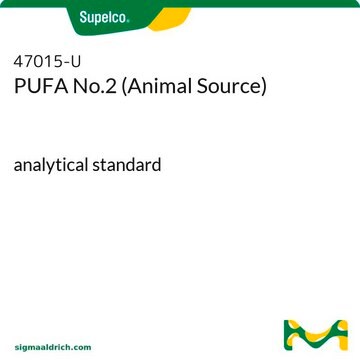91988
Tridecanoic acid
analytical standard
About This Item
Productos recomendados
grade
analytical standard
Quality Level
assay
≥99.0% (GC)
shelf life
limited shelf life, expiry date on the label
technique(s)
HPLC: suitable
gas chromatography (GC): suitable
bp
236 °C/100 mmHg (lit.)
mp
41-42 °C (lit.)
42-44 °C
format
neat
functional group
carboxylic acid
shipped in
ambient
storage temp.
room temp
SMILES string
CCCCCCCCCCCCC(O)=O
InChI
1S/C13H26O2/c1-2-3-4-5-6-7-8-9-10-11-12-13(14)15/h2-12H2,1H3,(H,14,15)
InChI key
SZHOJFHSIKHZHA-UHFFFAOYSA-N
¿Está buscando productos similares? Visita Guía de comparación de productos
Application
- analysis of pentaerythritol, phthalic acid and triglycerides in extracts from industrial alkyd resins using gas chromatography and high-performance liquid chromatography coupled to mass spectrometry
- quantification of metabolites of arachidonic acid from cultures of endothelial cells using high performance liquid chromatography coupled to mass spectrometry
Recommended products
signalword
Warning
hcodes
Hazard Classifications
Eye Irrit. 2 - Skin Irrit. 2 - STOT SE 3
target_organs
Respiratory system
Storage Class
11 - Combustible Solids
wgk_germany
WGK 3
flash_point_f
235.4 °F - closed cup
flash_point_c
113 °C - closed cup
ppe
dust mask type N95 (US), Eyeshields, Gloves
Elija entre una de las versiones más recientes:
¿Ya tiene este producto?
Encuentre la documentación para los productos que ha comprado recientemente en la Biblioteca de documentos.
Los clientes también vieron
Nuestro equipo de científicos tiene experiencia en todas las áreas de investigación: Ciencias de la vida, Ciencia de los materiales, Síntesis química, Cromatografía, Analítica y muchas otras.
Póngase en contacto con el Servicio técnico












